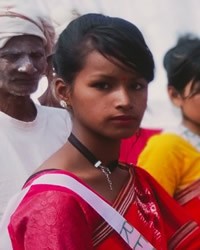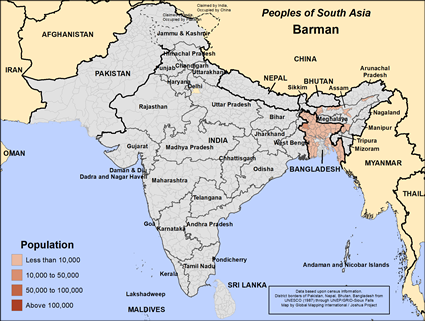Barman is a surname commonly used by people in Bangladesh. It is likely of Bengali origin and is found among various communities in the country. The meaning or origin of the surname "Barman" is not clear, and there could be multiple cultural and historical references associated with it.
They officially became Hindus the in 18th century converting from their ethnic religion. In 1826, the area of Assam where the Barman live came under British control. At the time of the Partition in 1947, the Barman who lived in what is now Bangladesh migrated to Assam. They still live in Assam, but most are now in Bangladesh.
The Barman are classified as a Scheduled Tribe, which means they are eligible for public jobs and special consideration for university admissions. Unfortunately, the illiteracy rate of the Barman is estimated to be 97%.
In India they mainly speak Dimasa, but those in Bangladesh speak Bengali like the majority of the people in that country.
Many Barman work as sharecroppers on others' land. Sharecroppers get a small percentage of the produce while the rest goes to the landowner. The Barman grow rice, wheat, vegetables, beans, mustard, potatoes, mangos, betel nut, and coconuts. Betel nut is a mild stimulant used in south Asia. The Barman make and sell bamboo items for cash. These include pipes for smoking, fishing poles, mats, and furniture. Some Barda men work in the construction trades and logging.
The Barman marry within their group but not within their particular clan. Families arrange marriages. The newly married couples often live with or near the groom's parents.
Each Barman village has a chief or matbar. He settles legal disputes, and no community activity can take place without his permission.
The Barman have their traditional costumes, music and dances, which they employ during holiday and family ceremonies. They perform a dance called meshak during festivals and holidays.
The Barman practice a form of Hinduism that is heavily influenced by folk religion. They worship and serve the gods of the Hindu pantheon. Hindus believe that by performing rituals and good works that they will attain moksha or freedom from the endless cycle of birth, death and rebirth. The Barman visit Hindu shrines and offer prayers, food, flowers, and incense to their gods in hopes of gaining protection and benefits. They do not have a personal or familial relationship with their gods like Christians or Jews. There are many forms of Hinduism, each with its own deities and beliefs.
The main yearly holidays of the Barman people are Holi, the festival of colors and the start of spring, Diwali, the festival of lights, Navratri, the celebration of autumn and Rama Navami, Rama's birthday. The Barman also worship their tribal deities and have their own holidays.
The Barman believe that evil spirits inhabit the forces of nature. These spirits and ancestors must be appeased through offering, rituals and prayers.
Solar panels can bring electricity to Barman villages. The Barman need help in educating their children. The adults need to learn how to read and write so they can better participate in Bangladesh's economy. The Barman would benefit with access to modern medicine. Most of all, the Barman need to hear and understand the message of Jesus Christ. He alone can forgive their sins and get them right with the one, true God.
Pray for loving gospel workers to catch a vision for reaching the Barman people for Jesus and that in God's sovereign timing the hearts of these people would be open and ready to follow him.
Pray for Jesus movements to bless extended families so the gospel will spread rapidly.
Pray for the spiritual lives of the Barman people to become fruitful so others will be drawn to Jesus Christ.
Scripture Prayers for the Barman in Bangladesh.
| Profile Source: Joshua Project |











